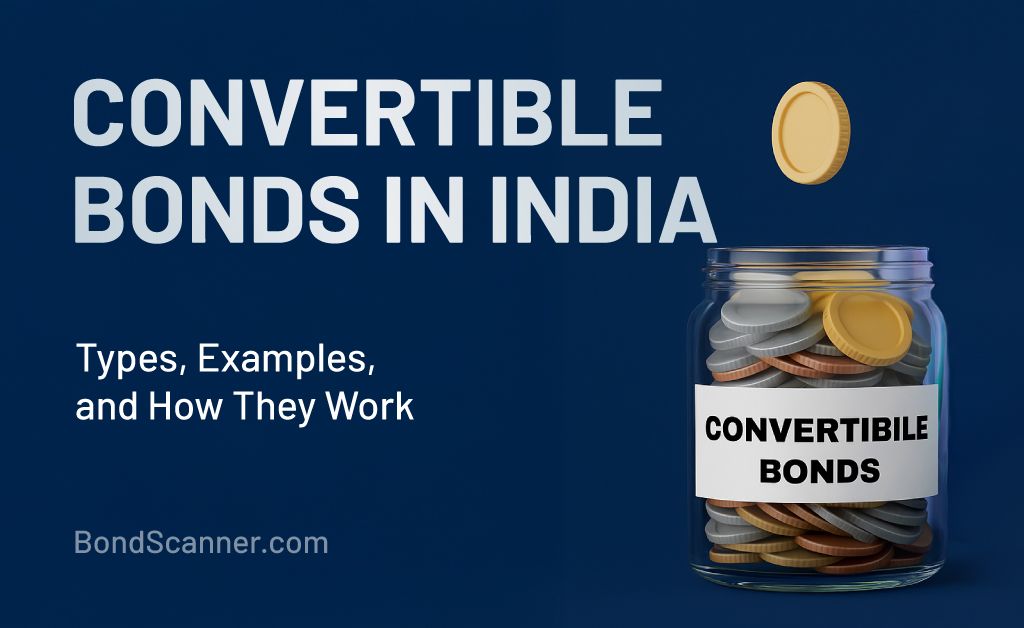Convertible Bonds: A Complete Guide to Hybrid Investment Instruments
07 October 2025

What Are Convertible Bonds?
In India’s evolving fixed-income landscape, investors are exploring hybrid instruments that blend the stability of bonds with the growth potential of equities. Convertible bonds serve as one such instrument, offering the dual advantage of fixed returns and potential equity participation.
At BondScanner, a SEBI-registered Online Bond Platform Provider (OBPP), we aim to provide transparent and educational insights into various types of bonds. This article explains what convertible bonds are, how they work, their types, and examples relevant to the Indian market.
A convertible bond is a type of corporate bond that gives the bondholder the option to convert their bond into a predetermined number of equity shares of the issuing company.
These instruments start as debt securities, providing fixed interest (coupon) payments. However, at a later stage—usually at the investor’s discretion—they can be converted into equity, giving exposure to the company’s share price performance.
This structure allows investors to enjoy the downside protection of debt while still participating in the upside potential of equity.
Key Features of Convertible Bonds
Fixed Interest Income:
Convertible bonds offer a regular interest payout (coupon) until conversion or maturity.
Conversion Option:
Investors have the right (but not the obligation) to convert their bonds into equity shares at a predetermined conversion ratio and conversion price.
Hybrid Nature:
These bonds act as a bridge between debt and equity—starting as debt instruments and potentially converting into shares.
Conversion Period:
The issuer specifies when the bond can be converted—either after a certain lock-in period or at the investor’s discretion.
Market Sensitivity:
The value of a convertible bond depends on both interest rate movements and equity price performance.
Types of Convertible Bonds
| Type | Description |
|---|---|
| Fully Convertible Bonds (FCBs) | Entire face value can be converted into equity shares of the issuing company. |
| Partly Convertible Bonds (PCBs) | Only a portion of the bond’s value is converted into equity; the remaining portion is redeemed in cash. |
| Mandatory Convertible Bonds (MCBs) | Conversion into equity is compulsory after a specific time or event. |
| Reverse Convertible Bonds (RCBs) | The issuer, not the investor, has the right to convert bonds into shares under predefined conditions. |
How Convertible Bonds Work
Let’s understand the mechanism through a simple illustration:
Example:
Suppose a company issues a convertible bond with the following terms:
Face Value: ₹1,000
Coupon Rate: 6% annually
Conversion Ratio: 20 shares per bond
Conversion Price: ₹50 per share
Tenure: 5 years
If the company’s share price rises above ₹50 (say ₹70), the investor can convert their bond into 20 shares worth ₹1,400, benefiting from equity appreciation. If the price remains below ₹50, the investor can hold the bond and continue earning the 6% interest until maturity.
This flexibility to switch between fixed income and equity growth makes convertible bonds appealing for moderate-risk investors.
Convertible Bonds in India
In India, convertible bonds are primarily issued by corporate entities to raise capital for expansion, debt restructuring, or new projects.
While the Indian bond market is still developing compared to global peers, some notable issuances include Fully Convertible Debentures (FCDs) and Partly Convertible Debentures (PCDs) by companies in the infrastructure, finance, and manufacturing sectors.
Regulations for convertible bonds fall under the purview of:
Securities and Exchange Board of India (SEBI)
Companies Act, 2013
Reserve Bank of India (RBI) (for foreign investments)
Convertible bonds also feature in foreign currency convertible bonds (FCCBs)—instruments issued by Indian companies overseas to attract foreign capital. These are governed by RBI and FEMA guidelines.
Advantages of Convertible Bonds
Dual Benefit of Debt and Equity:
Investors earn steady interest while retaining the option to benefit from rising share prices.
Downside Protection:
Even if the stock underperforms, investors receive periodic interest and capital repayment (if not converted).
Lower Coupon Rates for Issuers:
Since conversion offers potential equity upside, issuers can raise funds at lower interest rates than regular bonds.
Capital Appreciation Opportunity:
Conversion allows investors to participate in the issuing company’s growth without directly buying shares.
Risks Associated with Convertible Bonds
While convertible bonds offer flexibility, they are not risk-free. Key risks include:
Market Risk: If the stock price falls, the conversion option becomes unattractive.
Interest Rate Risk: Rising interest rates can lower bond prices.
Credit Risk: The issuer’s financial health affects both interest payments and redemption.
Liquidity Risk: These instruments may have limited secondary market trading, affecting exit options.
Investors should evaluate these risks carefully before investing.
Convertible Bonds vs Traditional Bonds
| Feature | Convertible Bonds | Traditional Bonds |
|---|---|---|
| Return Type | Fixed interest + equity upside | Fixed interest only |
| Risk Level | Moderate (depends on equity performance) | Low to moderate |
| Conversion Option | Yes, into shares | No |
| Coupon Rate | Generally lower | Higher |
| Market Sensitivity | Linked to both interest rates and stock prices | Linked mainly to interest rates |
Who Should Consider Convertible Bonds?
Convertible bonds are generally suited for:
Investors seeking steady returns with equity participation potential.
Those comfortable with moderate risk exposure.
Long-term investors interested in corporate growth opportunities.
However, since returns are subject to market performance and conversion terms, investors should assess their risk tolerance and financial goals before investing.
Convertible Bonds Example in India
For illustration, let’s consider a hypothetical scenario:
ABC Ltd. issues a Partly Convertible Bond worth ₹1,000 crore at a coupon of 6.5% with a conversion option after three years.
If the company’s share price appreciates, investors may convert their bonds into equity at a predetermined price. Otherwise, they continue earning interest until maturity.
Such structures are often used by companies in sectors like infrastructure, finance, and energy to attract diversified funding without immediate equity dilution.
Frequently Asked Questions (FAQs)
1. What is a convertible bond?
A convertible bond is a debt instrument that can be converted into equity shares of the issuing company after a specified period.
2. What are the types of convertible bonds?
The main types include fully convertible, partly convertible, mandatory convertible, and reverse convertible bonds.
3. Do convertible bonds pay interest?
Yes, investors receive fixed interest payments (coupons) until the bond is converted or matures.
4. How are convertible bonds taxed in India?
Interest income is taxed as per the investor’s income tax slab. Capital gains tax may apply upon conversion or sale of the bonds.
5. Are convertible bonds safe?
They are relatively safer than direct equity investments but riskier than government or AAA-rated corporate bonds due to conversion-linked uncertainty.
Conclusion
Convertible bonds offer a unique blend of stability and growth, bridging the gap between traditional debt and equity instruments. They provide flexibility for both issuers and investors, especially in an evolving market like India’s.
For those exploring hybrid instruments, understanding the structure, conversion terms, and risks of convertible bonds is essential before investing.
At BondScanner, we aim to educate investors about various bond categories—helping them make informed, transparent, and well-researched decisions in the fixed-income market.
Disclaimer
This blog is intended solely for educational and informational purposes. The bonds and securities mentioned herein are illustrative examples and should not be construed as investment advice or personal recommendations. BondScanner, as a SEBI-registered Online Bond Platform Provider (OBPP), does not provide personalized investment advice through this content.
Readers are advised to independently evaluate investment options and seek professional guidance before making financial decisions. Investments in bonds and other securities are subject to market risks, including the possible loss of principal. Please read all offer documents and risk disclosures carefully before investing.
Recent Blogs

GPF Full Form: Understanding General Provident Fund and Its Role in Salary
A detailed guide explaining the GPF full form in salary, its benefits, working mechanism, and how it functions for employees in India.
20 Feb 2026

Difference Between Loan and Debenture: Understanding Key Financial Concepts
Explore the key differences between loans and debentures, their characteristics, benefits, and how each works in corporate finance.
20 Feb 2026

AMO Order Explained: What It Is, Charges, Timing & How to Place an AMO Order in Zerodha
Learn about AMO (After Market Orders), how they work, charges, validity, and how to place AMO orders in Zerodha, along with key differences from pre-market orders.
19 Feb 2026